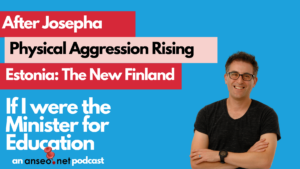This week was the first time in ages that I was able to take part in the wonderful #dojoChatEU which takes places every Wednesday on Twitter. It’s run by ClassDojo and there are dozens of teachers across the world who take part in it. This week’s discussion was all about resilience, a huge topic in Ireland at the moment. It was a shame there weren’t many Irish teachers taking part in it but I was interested in how other countries are facing the problems that are occurring due to the lack of resilience that seems to be taking hold of people. I was very interested in the comparisons to New Zealand and Ireland in particular. Anyway, here are my own responses to the 8 questions that were asked.
Q1: what does a resilient pupil look like in school?
The first question was a big one and very hard to answer! I found it difficult to answer because resilience looks different depending on a child’s situation. The child who has had to wake up himself, dress himself, feed himself, get to school himself and manages to be somewhat attentive in school versus the child who has his bag carried into school for him by his mum and leaves her with a giant hug are starting from very different places. It’s possible that the first child will have to have natural resilience and may be able to cope with far more than the second child but then again, who knows?
Q2: what does a resilient pupil look like outside of the classroom?
This, for me, is the same as the first answer. It’s hard to tell and is contextual. A child who is let make mistakes, who can fail, who can fall, who can get hurt, who can face problems and can still get on with it, has resilience. I guess the adults around him have to give him those opportunities. Ultimately, in Ireland, we have a crisis with regards to resilience. In my opinion, we have fewer and fewer adults who give opportunities for children to become resilient. We also have a very unforgiving society in that mistakes are not acceptable and there are constantly shouts for blame and punishment when things do go wrong.
Q3: what does good ‘character education’ actually look like?
Two words: Emotional Intelligence. If we could teach this in schools and in life, we’d be doing a lot of good.
Q4: What outside organisations could help develop grit in school?
We’re lucky in Ireland to have a lot of organisations that discuss and promote positive mental health and resilience. I’m not sure whether other countries have this. Ireland, like most western countries, has seen its society change dramatically in the last 20 years. In Ireland, the two biggest constants that were trusted have fallen apart: the Catholic church and the political system. We haven’t found real replacements for these as a nation and we are still trying to grasp at the scraps of what is left. Ultimately, we are getting there with people realising that treating people equally and helping people take responsibility for their own bodies and minds is the way forward.
Q5: Why has ‘resilience’ become a concern in recent years?
I think I’ve summarised this in the above questions. There has been a huge shift in how young people think. This generation expect instant gratification and everything to be personalised for them. I don’t think this is particularly a terrible thing because some things should come instantly and easily. However, we need to understand that in a world where this is possible, there are some things that take time and it is ok to wait. We also need to realise that failing is ok. We also need to be allowed to be disappointed, to be sad, to not get what we want, to get hurt and so on. Learning can’t happen without failure.
Q6: What factors in school can hinder resilience?
The Irish school system, particularly at second level, is set up in such a way that failing isn’t seen positively. It needs to change and it needed to change twenty years ago. Will it change though?
Q7: what factors outside school can hinder resilience?
I think I’d be rich if I had the answer to this question. Societies are created by the people in them and we have probably made a lot of really bad choices when it comes to helping people’s resilience. As teachers, we see this happening every day and we are powerless to stop it.
Q8: if money was no object, what would you introduce to help foster resilience in school?
A lovely question to end the discussion. One thing one could use is a specialised mentor / teacher / coach in every school. Obviously that’s not going to happen but if money was limitless, I’d take it. However, starting from where we are at, I’d probably fund primary schools properly. On top of this, I think schools should also be places of equality. Currently most of them are not.



